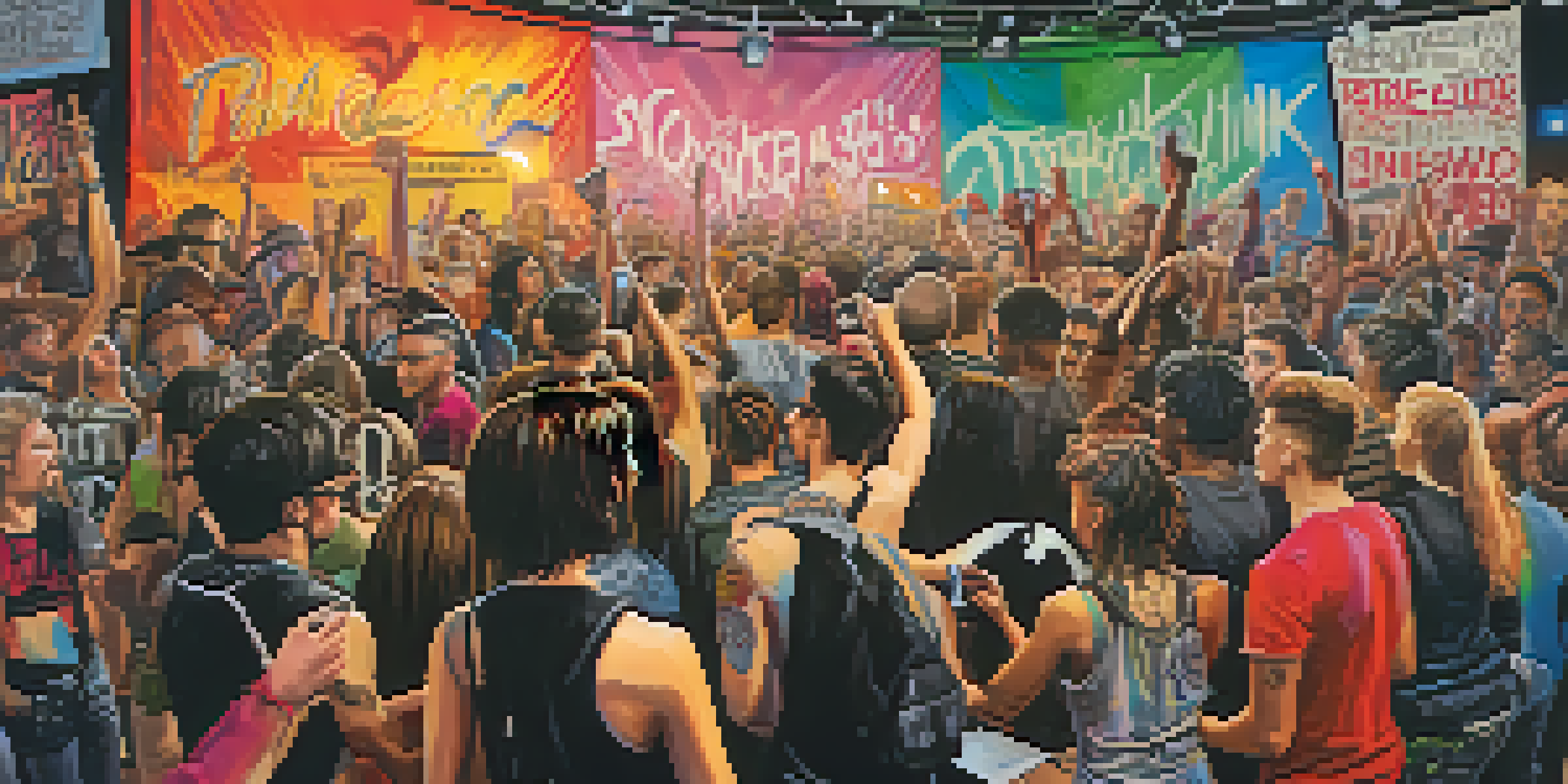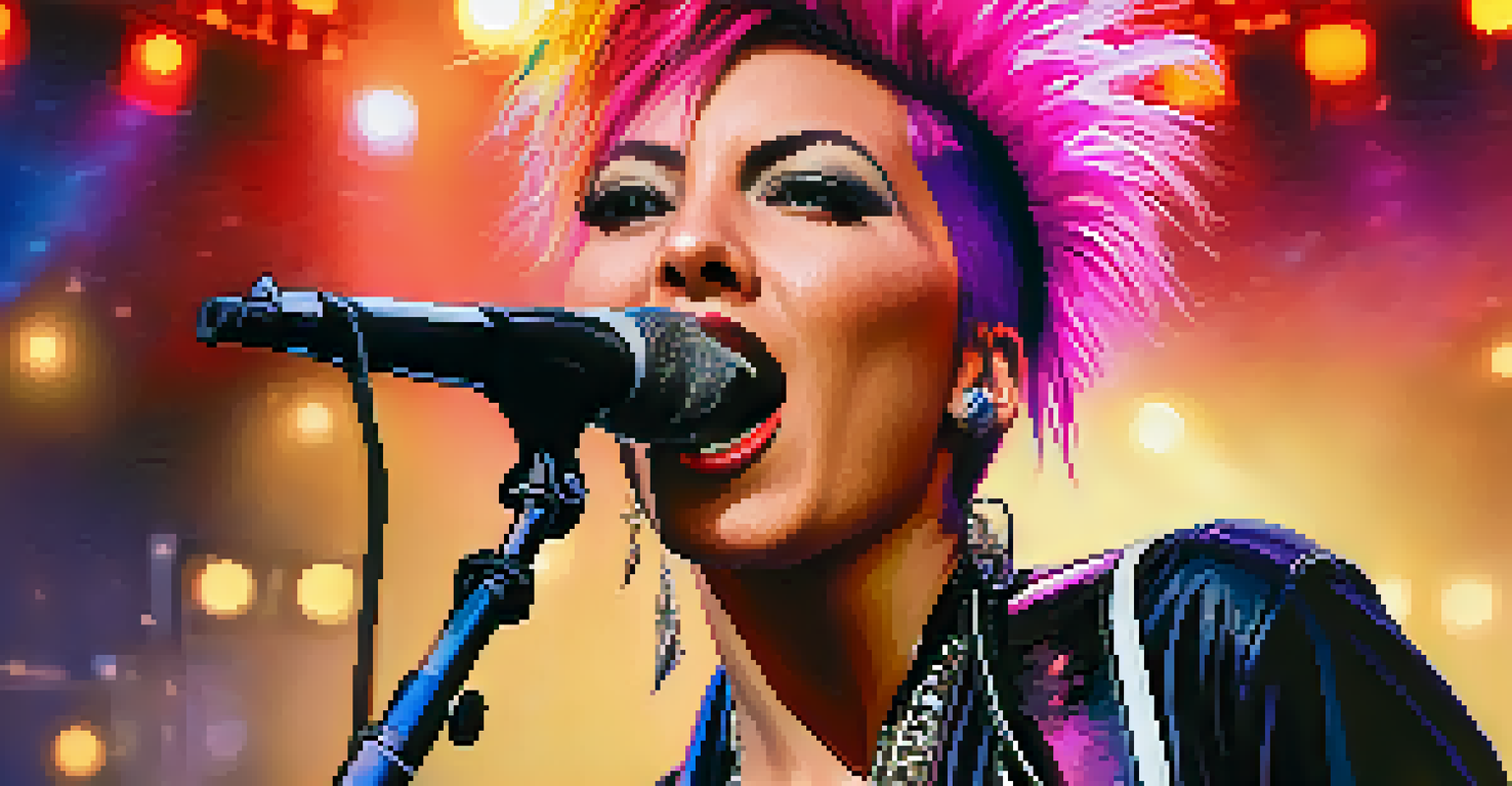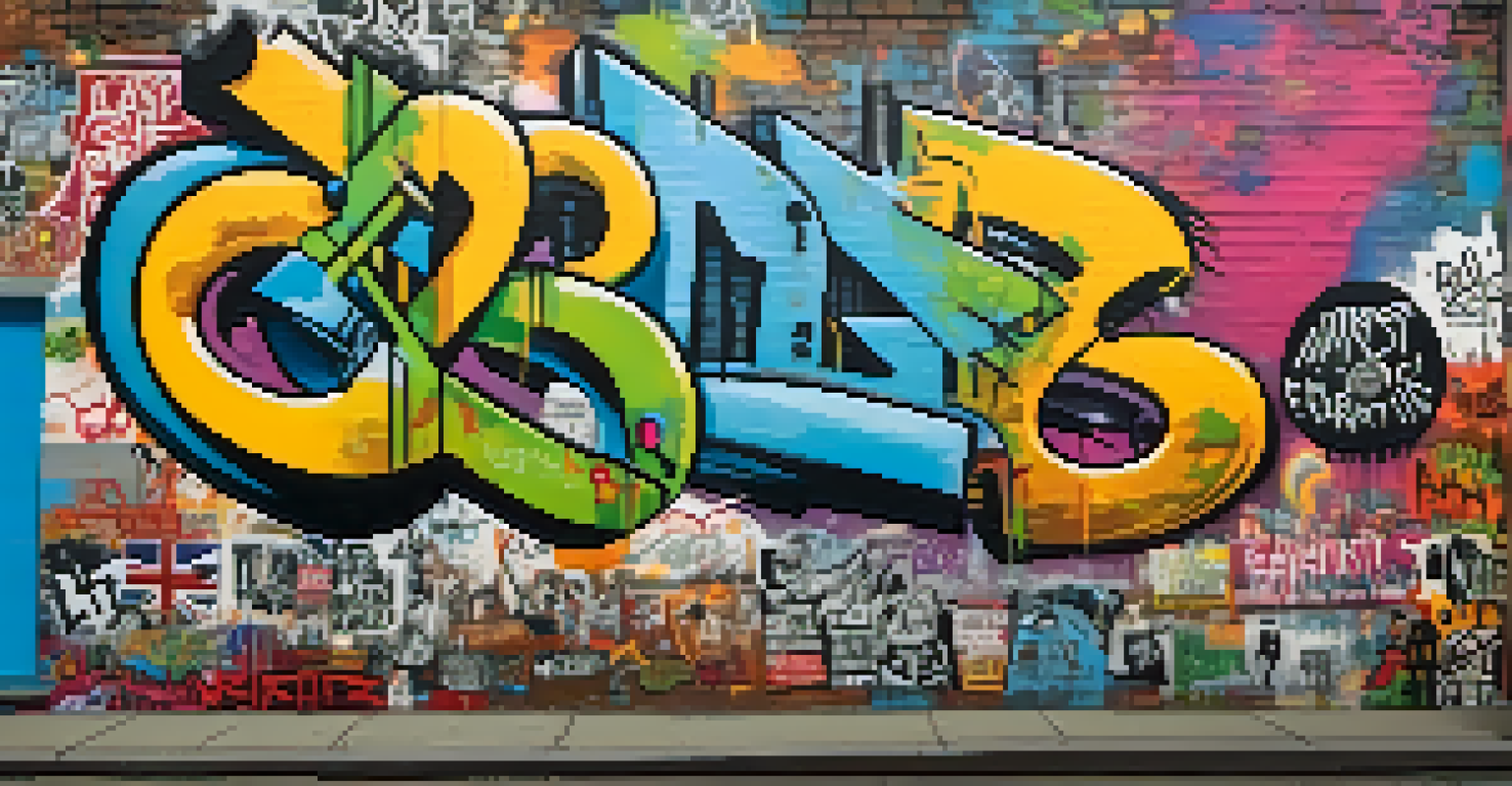The Influence of Punk Rock on Political Activism

The Birth of Punk Rock: A Voice for the Voiceless
Punk rock emerged in the 1970s as a rebellious response to mainstream music and societal norms. Bands like the Ramones and Sex Pistols gave a voice to the disillusioned youth, channeling their frustrations into raw, energetic music. This genre was more than just sound; it resonated with those feeling marginalized and unheard, igniting a sense of community among fans. It set the stage for punk to become a platform for political expression, laying the groundwork for future activism.
Punk is not dead; it just smells funny.
As punk rock gained popularity, it began to attract a diverse audience who resonated with its anti-establishment messages. The themes of rebellion and resistance found in punk lyrics often mirrored the struggles faced by marginalized groups, making it a unifying force for activism. This connection between music and social issues not only empowered individuals but also encouraged them to take a stand against injustice, setting a precedent for future movements.
Moreover, punk rock's do-it-yourself (DIY) ethos inspired many grassroots organizations and activist groups. Fans began to see that they could create their own change, whether through music, art, or community involvement. This sense of empowerment became a hallmark of punk culture, demonstrating that anyone could challenge the status quo and advocate for political change.
Punk Rock and the Anti-Establishment Movement
Throughout the late 1970s and 1980s, punk rock became synonymous with anti-establishment sentiments. As the genre evolved, bands like The Clash and Dead Kennedys used their music to critique government policies and societal injustices. Their lyrics often tackled issues such as war, poverty, and racism, encouraging listeners to question authority and think critically about the world around them. This rebellious spirit made punk music a rallying cry for those seeking change.

The punk movement's influence extended beyond music into various activist causes. Many punk bands participated in protests and demonstrations, lending their voices to movements like anti-war campaigns and civil rights activism. This blend of music and political activism created a powerful synergy that inspired fans to take action, whether through attending rallies or engaging in community activism.
Punk Rock as Political Voice
Punk rock emerged in the 1970s as a powerful platform for political expression, empowering marginalized communities and inspiring activism.
Furthermore, the punk scene became a hub for like-minded individuals to come together and organize for change. Independent record labels, fanzines, and underground shows allowed punks to share information and support one another's causes. This tight-knit community became a breeding ground for political activism, demonstrating how music can be a catalyst for social change.
Women in Punk: Breaking Barriers and Leading Activism
While punk rock is often associated with male musicians, women have played a crucial role in shaping the genre and its political landscape. Bands like The Slits and Joan Jett & the Blackhearts challenged gender norms and provided strong female role models in a predominantly male industry. Their presence not only expanded the punk sound but also highlighted issues like sexism and gender equality within the music scene and society at large.
The music is not just a sound; it’s a message that can change lives.
The feminist punk movement, often referred to as 'Riot Grrrl,' emerged in the early 1990s as a direct response to the lack of female representation in punk. This movement empowered young women to express their experiences and frustrations through music, art, and activism. By addressing topics such as sexual assault, body image, and reproductive rights, Riot Grrrl bands like Bikini Kill and Sleater-Kinney created a space for women to voice their concerns and demand change.
The impact of women in punk extends far beyond the music itself; they have been key players in various social movements. Their activism has sparked conversations about feminism, LGBTQ+ rights, and racial equality, showing that punk rock is not just about rebellion but also about creating inclusive spaces for dialogue and action. This legacy continues to inspire new generations of female musicians and activists.
Punk Rock's Global Influence on Activism
Punk rock's influence on activism transcends borders, resonating with youth in various cultures around the world. In countries facing political oppression, punk music has provided a means of resistance and expression. For example, in Eastern Europe during the Cold War, punk bands became symbols of defiance against authoritarian regimes, using their music to inspire solidarity and hope among the oppressed.
In Latin America, punk rock has intertwined with social movements, addressing issues such as human rights abuses and economic inequality. Bands like Los Crudos and La Polla Records have used their lyrics to advocate for social justice and challenge government corruption. This blending of music and activism showcases how punk can adapt to different contexts while maintaining its core message of resistance.
Women Shaping Punk Activism
Women have played a crucial role in punk rock, challenging gender norms and leading movements that address sexism and social injustice.
Moreover, the internet has allowed punk rock to reach even more audiences, facilitating global connections among activists. Online platforms have enabled musicians to share their messages and mobilize supporters for various causes, from climate change to anti-racism. This digital age has further solidified punk rock's role as an influential force in global activism, demonstrating that the spirit of rebellion knows no boundaries.
The Connection Between Punk Rock and Environmental Activism
In recent years, punk rock has increasingly intersected with environmental activism. Many punk bands have embraced eco-conscious themes in their lyrics and actions, raising awareness about climate change and sustainability. This shift reflects a growing urgency among musicians and fans alike to address the environmental crises facing our planet, making it a priority within the punk community.
Punk festivals and shows often incorporate eco-friendly practices, such as promoting zero waste and highlighting local environmental organizations. For instance, events like the Punk Rock Bowling festival have included panels and discussions on sustainability, encouraging attendees to engage with activism. This commitment to environmental issues showcases how punk rock has evolved to address contemporary challenges, while still holding onto its roots of rebellion.
Additionally, many punk musicians have used their platforms to advocate for environmental justice, aligning with movements that seek to protect marginalized communities affected by ecological degradation. By amplifying these voices and causes, punk rock continues to be a powerful tool for raising awareness and inspiring action around the pressing issues of our time.
Punk Rock: A Voice for Marginalized Communities
Punk rock has always been a space for marginalized voices, providing a platform for those who feel unheard. From LGBTQ+ rights to racial equality, punk has served as an outlet for expressing the struggles and triumphs of diverse communities. By addressing these issues in their music, punk bands have fostered a sense of solidarity and empowerment among fans, encouraging them to advocate for their rights.
The inclusion of marginalized perspectives within punk rock has led to a rich tapestry of sounds and messages. Bands like Anti-Flag and Bad Brains have tackled issues of racism, homophobia, and social injustice, showing that punk is not just a genre but a movement for change. This commitment to inclusivity has made punk a safe space for individuals from all walks of life, reinforcing the idea that everyone deserves to be heard.
Global Reach of Punk Activism
Punk rock's influence on activism spans the globe, uniting youth in various cultures to address issues like political oppression and environmental justice.
Moreover, the punk community often rallies around specific causes, mobilizing resources and support for marginalized groups. Whether through benefit shows or awareness campaigns, punks have demonstrated their commitment to activism in ways that are both impactful and meaningful. This collective action illustrates how punk rock continues to be a powerful vehicle for social change.
The Future of Punk Rock and Political Activism
As we look to the future, the relationship between punk rock and political activism remains as relevant as ever. With social issues continuing to dominate headlines, the punk community is poised to respond with the same passion and creativity that has defined the genre for decades. Emerging bands are already addressing contemporary issues such as systemic racism, economic disparity, and climate change, ensuring that the spirit of punk activism lives on.
The rise of social media has also transformed the way punk musicians engage with activism. Platforms like Instagram and Twitter allow artists to share their messages and connect with fans in real time, amplifying their reach and impact. This digital landscape presents new opportunities for collaboration, mobilization, and education, making it easier than ever for punk rockers to inspire change.

Ultimately, the future of punk rock and political activism is bright. As long as there are voices yearning for change, punk will continue to serve as a powerful medium for expressing dissent and advocating for justice. This enduring legacy reminds us that music can be a catalyst for social transformation, uniting individuals in the pursuit of a better world.